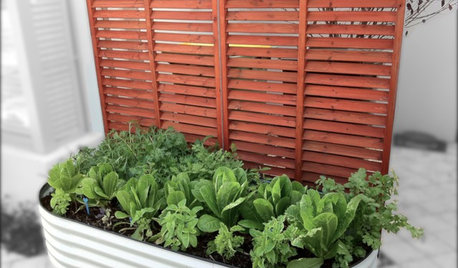Help please with food co-op consignment policies, procedures.
starwoodfarm
17 years ago
Related Stories

MOST POPULAR9 Real Ways You Can Help After a House Fire
Suggestions from someone who lost her home to fire — and experienced the staggering generosity of community
Full Story
HOUZZ TOURSMy Houzz: A Handcrafted Bohemian Homestead in Texas
Overflowing with art and intertwined with gardens, this pieced-together home is a marvel of creativity
Full Story
FEEL-GOOD HOME21 Ways to Waste Less at Home
Whether it's herbs rotting in the fridge or clothes that never get worn, most of us waste too much. Here are ways to make a change
Full Story
MOST POPULARHow to Create an Inventory, Whether You're Naturally Organized or Not
Documenting your home items is essential, even if disaster seems unimaginable. And it may be easier than you think
Full Story
ACCESSORIESEasy Green: Cut Electricity Use With 15 Unplugged Home Devices
Crank up the energy savings, courtesy of household items that come into power the old-fashioned way: manually
Full Story
MOST POPULARThe Not Naturally Organized Parent's Guide to the Holidays
This year get real about what you can and cannot handle, and remember the joys of spending time with the ones you love
Full Story
MOST POPULAR5 Ways to Pare Down Your Stuff — Before It Gets in the Door
Want to free up some room around the house? Rethink gift giving, give yourself a shopping mantra and just say, ‘No, thank you’ to freebies
Full Story
MATERIALSInsulation Basics: What to Know About Spray Foam
Learn what exactly spray foam is, the pros and cons of using it and why you shouldn’t mess around with installation
Full Story
FURNITUREDecorating 101: How to Shop for Furniture
Learn what furniture to get rid of, what to look for when buying, and how to avoid mistakes
Full Story
WORKING WITH PROSYour Guide to a Smooth-Running Construction Project
Find out how to save time, money and your sanity when building new or remodeling
Full Story





ohiorganic
starwoodfarmOriginal Author
Related Professionals
Forest Park Landscape Architects & Landscape Designers · Taylorsville Landscape Architects & Landscape Designers · Forest City Landscape Architects & Landscape Designers · Cary Landscape Contractors · Nanuet Landscape Contractors · Stony Brook Landscape Contractors · Teaneck Landscape Contractors · Uxbridge Landscape Contractors · Goldenrod Landscape Contractors · Bell Gardens Solar Energy Systems · Compton Solar Energy Systems · Danville Solar Energy Systems · El Mirage Solar Energy Systems · Freeport Solar Energy Systems · Homer Glen Solar Energy Systems